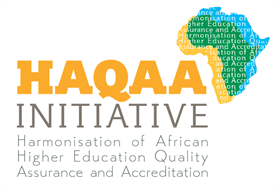This final phase of the HAQAA Training Course focused on the state of development of different QA systems in Africa and on how to advance the Pan African QA and Accreditation Framework –PAQAF– so as to respect the diversity in QA and accreditation approaches across the continent and enable capacity building.
Background
The first phase of the HAQAA Training Course started with a study visit in October 2016 to Belgium and Germany. 48 participants were selected via competitive calls for interest. All candidates had the backing of their ministries and were tasked to be disseminators in their own systems. Participants learned about the situation of QA in the higher education systems in Europe and the QA frameworks of the European Higher Education Area. They were split in two groups (English and French speaking groups). Subsequently, participants defined Personal Action Plans, a specific project relevant to QA reform and improvement in their own countries. Examples included setting up a national QA agency and, in the case of the SADC countries, a collaborative endeavor to develop a credit system for the SADC region.
The Second Presence Phase of the HAQAA Training Course “Developing a Common Understanding of Quality Assurance in Africa” took place in Accra, Ghana from the 31st of May to the 2nd of June 2017. Participants from more than 40 African countries representing nominated professionals from African QA bodies, universities and regional institutions for higher education were present. This three day workshop aimed to discuss and improve QA systems in Africa and to raise awareness for news tools and frameworks being developed under PAQAF, like the African Standards and Guidelines for QA (ASG-QA).
Participants were highly committed to working together in order to harmonise QA structures in higher education in Africa, build capacity in systems with no national QA bodies and generally enhance networking of QA professionals across the continent. Participants also expressed a keen interest to contribute to future activities of HAQAA/PAQAF. The idea of creating a group of “ambassadors for PAQAF” was discussed, for example, as was the need to design future trainings on how to implement PAQAF tools likes the ASG-QA.

52 people participated on the 2nd phase of the HAQAA Training Course which had representatives from more than 30 countries from Africa and Europe
The first draft of the ASG-QA presented by Rispa Odongo, the Chair of the Technical Working Group on the development of the ASG-QA, sparked considerable interest and generated positive feedback. The ASG-QA aim to support higher education institutions and quality assurance agencies in Africa in implementing good practices for quality assurance, based on commonly agreed principles. It will become the main reference document for African QA systems under PAQAF. The first draft is currently subject to a continental online consultation in four languages. Through this link, you may find the draft document with specific questions for your feedback: https://www.surveymonkey.com/r/QRPPXQ2
The Southern Africa Development Community and the East African Countries take a step forward in designing regional action plans
In addition to the Training Course, partners from the Africa Development Community (SADC) and the East African Countries (EAC) had the opportunity to discuss and design the regional personal action plans (PAPs) through two parallel meetings held on 30 May 2017. Both gatherings, supported by the HAQAA Initiative, showed a higher level of dedication and commitment by both the initiative and the participants from these regions.
The personal action plan (PAP) aims to contribute to the development of their national systems and questions related to regional and continental QA and accreditation initiatives which were also explored during the workshop.

The East African group during the meeting that aimed to discuss the next steps for the design of the regional PAPs.
Anglophone and Francophone participants were brought together in Accra in May/June 2017 to focus on sharing practices and finding common interests across Africa, and to generate feedback for and interest in PAQAF. Discussions benefitted from the diverse composition of the groups, which included both regulatory bodies (QA bodies and ministries) and higher education institutions that ideally need to work together to develop QA systems in higher education. The participants appreciated the exchange between colleagues from so many diverse countries and found this to be a special element of the Training Course.
The Training Course concluded with the delivery of certificates to the participants who attended both presence phases of the course and successfully reported on their Personal Action Plans. A follow-up workshop is envisaged for 2018 so as to take stock and support the implementation of PAQAF.


